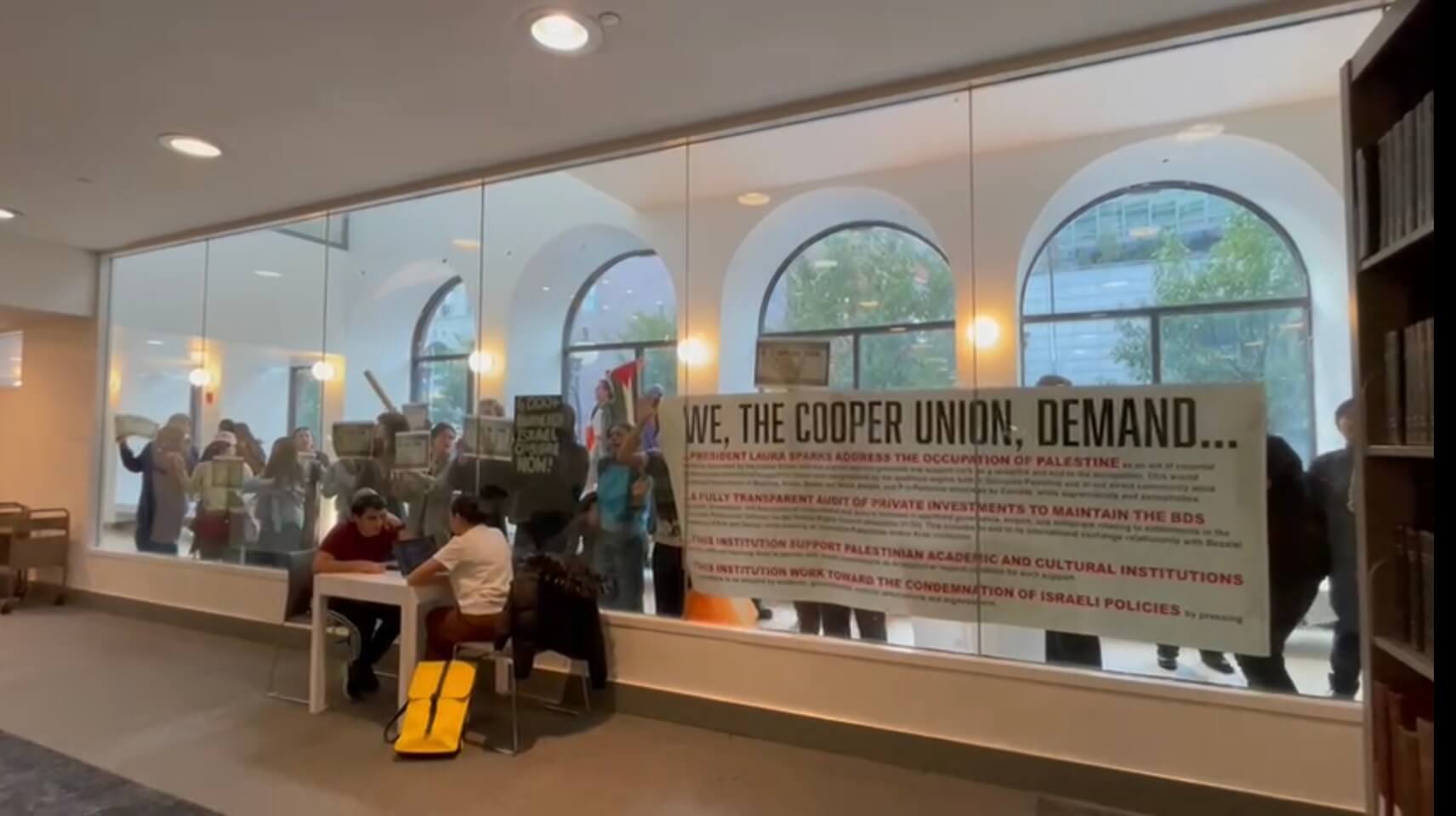Jewish students at Cooper Union told to hide as pro-Palestinian protesters banged on doors of locked library
At Cooper Union in Manhattan, two Jewish students said they feared assault in aftermath of protest

As Jewish students studied inside the Cooper Union library, a pro-Palestinian protest formed on the other side of the glass. One student who was inside said the action was “targeted.” Courtesy of Abigail Mottahedeh
A number of Jewish students at Cooper Union college in Manhattan said they feared for their safety Wednesday when pro-Palestinian protesters banged on the locked door of the library where they were sheltering and chanted “Globalize the Intifada.”
“I really, truly believe they would have done physical assault if they came in,” said one of the students, a first year, speaking on the condition of anonymity out of security concerns. “For me it was like: How could it get to this point?”
Officials at Cooper Union, an arts and engineering school, downplayed the incident, saying in a statement Wednesday night that the library was closed for about 20 minutes while student protesters passed through. “Some students who were previously in the library remained during this time,” the statement said. “All students have now dispersed.”
The situation in the library followed a three-hour protest in which about 40 activists called on Cooper Union’s president to address the Israel-Hamas war and divest school assets from Israel. About 15 students staged a silent counter-protest with photos of some of the 220 hostages Hamas abducted during its Oct. 7 terrorist attack on Israel.
Afterward, the protesters said they wanted to go into the building on East Seventh Street that houses the office of the school’s president, Laura Sparks.
A video of the scene posted online and corroborated by a Cooper Union senior who was there shows a group of about 20 students heading up a flight of stairs. The senior, who spoke on the condition of anonymity out of security concerns, said she was worried about the safety of students working in the studios upstairs and called the police.
She said she then went into the library, which is on the first floor of the same building, where a number of Jewish students were studying.
The first-year student, who is 19, said that two Jewish people, one wearing a yarmulke, were sitting by the window, and that the protesters began banging on the glass from outside. Then, she said, they went to the library door.
Another video of the Cooper Union library protest shared with me by a Jewish student. pic.twitter.com/628bfzB76h
— Louis Keene (@thislouis) October 25, 2023
The senior said a library employee suggested the Jewish students escape through a back exit the school president — whose office is on the seventh floor — had used earlier.
The other student said a librarian who was trying to comfort the students suggested a spot upstairs where they could be out of the protesters’ view.
It reminded her of Anne Frank — “like, ‘go hide in the attic,'” she said. “Really, I have to hide, in the United States of America? I can’t sit in a place where there’s windows because I might be attacked. That’s basically what she said. She was trying to be helpful, but — you know?
“The fact that I needed to hide — that really, I just couldn’t understand.”
The school statement said the students were accompanied by library staff and chose to stay in the library until the protest was over, about 5:30 p.m. Police officers were on campus throughout the day, it added.
A spokesman for the New York Police Department said the original protest was “somewhat disorderly” but that no one was arrested. Chief of Patrol John Chell on Thursday said of the incident on Thursday:”There was no direct threats, there was no damage, and there was no danger to any students in that school.”
Both students interviewed said the students in the library refused to hide or leave through a back door. Instead, they waited inside the locked library for about half an hour until the protest died down.
The first-year, who is from New York, said antisemitism has been simmering on campus amid anti-Israel protests since the Oct. 7 attack. After Wednesday’s incident, she said, her father wants to pull her out of the school.
A message from our Publisher & CEO Rachel Fishman Feddersen

I hope you appreciated this article. Before you go, I’d like to ask you to please support the Forward’s award-winning, nonprofit journalism so that we can be prepared for whatever news 2025 brings.
At a time when other newsrooms are closing or cutting back, the Forward has removed its paywall and invested additional resources to report on the ground from Israel and around the U.S. on the impact of the war, rising antisemitism and polarized discourse.
Readers like you make it all possible. Support our work by becoming a Forward Member and connect with our journalism and your community.
— Rachel Fishman Feddersen, Publisher and CEO


























